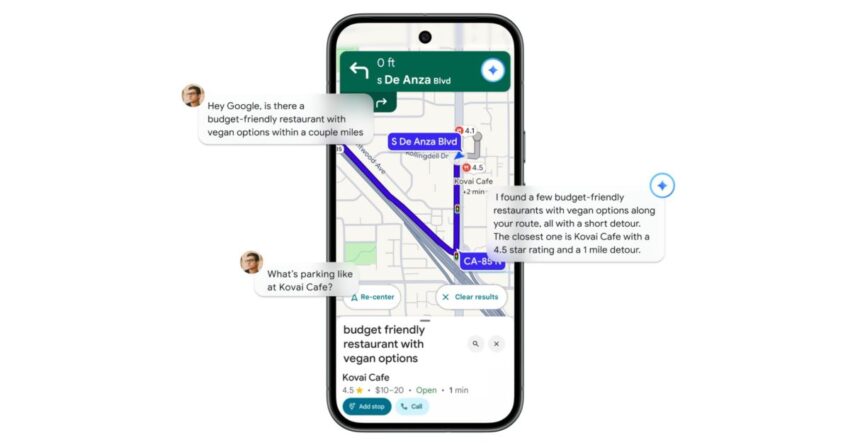
google maps starts rolling out gemini for Google Maps has initiated the rollout of its advanced navigation system, Gemini, across all navigation modes, enhancing user experience and functionality.
google maps starts rolling out gemini for
Introduction to Gemini
In early November 2025, Google announced the introduction of Gemini, a new navigation system designed to improve the way users interact with Google Maps. This rollout marks a significant advancement in navigation technology, aiming to provide more accurate and efficient routing options. Gemini is not just a standalone feature; it integrates with various aspects of Google Maps, including place listings and visual search capabilities through Google Lens.
Features of Gemini
Gemini is equipped with several innovative features that set it apart from previous navigation systems. These enhancements are designed to cater to a wide range of users, from everyday commuters to tourists exploring new cities.
Enhanced Routing Algorithms
One of the standout features of Gemini is its enhanced routing algorithms. These algorithms utilize real-time data to provide users with the fastest and most efficient routes. By analyzing traffic patterns, road conditions, and even weather forecasts, Gemini can suggest alternative routes that may save time and fuel. This is particularly beneficial for users in urban areas where traffic congestion is a common issue.
Integration with Place Listings
Gemini’s integration with place listings is another significant improvement. Users can now receive navigation guidance that includes detailed information about nearby businesses, landmarks, and points of interest. This feature not only helps users navigate but also enhances their overall experience by providing context about their surroundings. For instance, while navigating to a restaurant, users may receive recommendations for nearby attractions or shops.
Visual Search Capabilities with Google Lens
In addition to its routing capabilities, Gemini is set to enhance Google Lens functionality. Users can expect improved visual search capabilities that allow them to identify landmarks and businesses simply by pointing their camera at them. This feature is particularly useful for tourists or individuals exploring unfamiliar areas, as it provides instant information and navigation options without the need to type in queries.
Implications of the Rollout
The rollout of Gemini has several implications for users and stakeholders alike. As Google continues to innovate in the navigation space, it raises questions about competition, user privacy, and the future of navigation technology.
Impact on User Experience
The introduction of Gemini is poised to significantly enhance the user experience on Google Maps. By providing more accurate routes and relevant information about surroundings, users can expect a more seamless navigation experience. This is particularly important in a world where time efficiency is paramount, and users are increasingly reliant on technology for daily tasks.
Competition in the Navigation Market
With the launch of Gemini, Google is positioning itself to maintain its dominance in the navigation market. Competitors such as Apple Maps and Waze will need to respond to these advancements to retain their user bases. The introduction of sophisticated features like real-time traffic analysis and integration with visual search technology may compel competitors to innovate further, leading to a more dynamic and competitive landscape.
User Privacy Concerns
As with any technological advancement, the rollout of Gemini raises concerns regarding user privacy. The collection of real-time data for improved routing and recommendations necessitates a robust data privacy framework. Users may be apprehensive about how their location data is used and stored. Google has historically faced scrutiny over its data practices, and it will be essential for the company to address these concerns transparently to maintain user trust.
Stakeholder Reactions
The response to the rollout of Gemini has been mixed among various stakeholders, including users, industry experts, and competitors.
User Feedback
Initial user feedback on Gemini has been largely positive, with many praising the improved routing capabilities and the integration of place listings. Users have reported that the new features make navigation more intuitive and informative. However, some users have expressed concerns about the accuracy of real-time data, particularly in less populated areas where data may be limited.
Industry Expert Opinions
Industry experts have noted that the rollout of Gemini represents a significant step forward in navigation technology. Many believe that the integration of advanced algorithms and visual search capabilities could set a new standard for navigation applications. However, experts also caution that the success of Gemini will depend on its ability to maintain accuracy and reliability over time.
Competitor Reactions
Competitors in the navigation space are closely monitoring the rollout of Gemini. Some have begun to explore ways to enhance their own offerings in response to Google’s advancements. For instance, Apple Maps may look to bolster its features to compete more effectively, while Waze could enhance its community-driven features to retain its user base. The competitive landscape is likely to evolve as companies strive to keep pace with Google’s innovations.
Future Developments
As Google continues to roll out Gemini, users can expect further enhancements and updates in the coming months. The company has a history of iterating on its products based on user feedback and technological advancements.
Potential for AI Integration
One area of potential growth for Gemini is the integration of artificial intelligence (AI). AI could enhance the system’s ability to predict traffic patterns and suggest optimal routes based on user behavior. This could lead to an even more personalized navigation experience, where the system learns individual preferences and adapts accordingly.
Expansion of Features
Google may also expand the features of Gemini to include additional functionalities such as augmented reality navigation. This could allow users to visualize their routes in real time through their smartphone cameras, providing an immersive navigation experience. Such advancements could further differentiate Google Maps from its competitors and solidify its position as a leader in the navigation market.
Conclusion
The rollout of Gemini in Google Maps marks a significant milestone in navigation technology. With enhanced routing algorithms, integration with place listings, and improved visual search capabilities, Gemini is set to transform the way users navigate their environments. While the implications of this rollout are vast, including potential impacts on user experience, competition, and privacy, the overall reception has been positive. As Google continues to innovate, the future of navigation looks promising, with exciting developments on the horizon.
Source: Original report
Was this helpful?
Last Modified: November 27, 2025 at 12:37 pm
0 views















